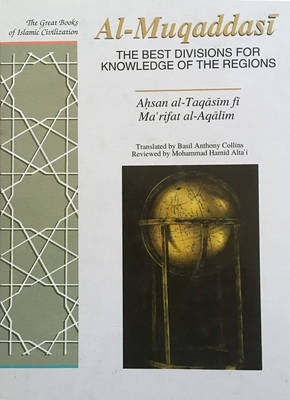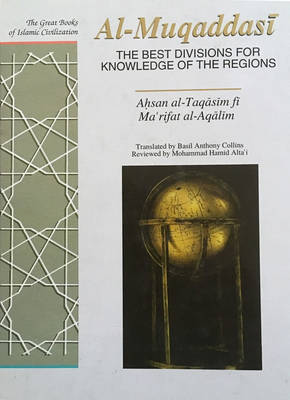
- Retrait gratuit dans votre magasin Club
- 7.000.000 titres dans notre catalogue
- Payer en toute sécurité
- Toujours un magasin près de chez vous
- Retrait gratuit dans votre magasin Club
- 7.000.0000 titres dans notre catalogue
- Payer en toute sécurité
- Toujours un magasin près de chez vous
Description
One thousand years ago al-Muqaddasi, "the man from Jerusalem", wrote in Arabic an epic geographical treatise, which is also a great work of literature. This treatise was based on some twenty years of experiences undergone and observations noted in his survey of the realm of Islam, from the Atlantic to the Indian Ocean. Early in the second half of the nineteenth century the German orientalist, Aloys Sprenger, brought to the attention of the West a manuscript of al-Muqaddasi's work. Sprenger's enthusiasm over the content of the manuscript is reflected in his judgement that its author is the greatest geographer of all time; and this view is shared by many scholars. The translation by Basil Anthony Collins published here is the first rendition into a Western language of al-Muqaddasi's treatise. Al-Muqaddasi was born in the year 945 of the Common Era (CE), which corresponds to the year 334 of the Islamic calendar (AH), and he died towards the close of the millennium. Defining the area of his study as that where the presence of the religious and political institutions of Islam dominated, he travelled throughout the regions observing, enquiring, researching, corroborating, weighing and sifting evidence, taking notes and writing drafts. Ahsan al-Taqasim fi Ma'rifat al-Aqalim, The Best Divisions for Knowledge of the Regions, was eventually published in 985CE/375AH, and a revised edition was produced three years later. Al-Muqaddasi attributes his motivation for travelling for twenty years, suffering hardships and writing about his travels, to divine inspiration: the accomplishment would be pleasing to his Lord, and would give life to his own memory. At the same time, the suggestion that he journeyed as an agent for the Fatimid regime in Egypt cannot be dismissed. Whatever the reason for his travels, al-Muqaddasi shows himself to be a hardy, intelligent, versatile, resourceful and well-informed man. He designed his book to appeal to a variety of interests, and even to entertain. Yet, quite strikingly, his perspective on aspects of the geographical method touches on concerns which have received greater attention only in more recent times. For example, his ranking of settlements according to their functions is quite prescient, his use of maps in accord with modern practice and his excursion into determinism based on toponymy is, to say the least, unusual. All in all, al-Muqaddasi's work bespeaks an interested and interesting man, seeing his world through a frame of reference derived from his deeply held religious belief, yet capable of making assessments with probity and common sense, striving scrupulously to get at the truth of the matter as a true scientist.
Spécifications
Parties prenantes
- Auteur(s) :
- Editeur:
Contenu
- Nombre de pages :
- 498
- Langue:
- Anglais
- Collection :
Caractéristiques
- EAN:
- 9781873938140
- Date de parution :
- 30-09-94
- Format:
- Livre relié
- Format numérique:
- Genaaid
- Dimensions :
- 229 mm x 152 mm
- Poids :
- 1190 g

Les avis
Nous publions uniquement les avis qui respectent les conditions requises. Consultez nos conditions pour les avis.






